

Larry Lessig: Laws that choke creativity. Richard Dawkins - Militant Atheism - TED. Lawrence Lessig: We the People, and the Republic we must reclaim. Larry Lessig Remix 2007 TED. The Future of Ideas. The Future of Ideas: The Fate of the Commons in a Connected World (2001) is a book by Lawrence Lessig, at the time of writing a professor of law at Stanford Law School, who is well known as a critic of the extension of the copyright term in US.[1] It is a continuation of his previous book Code and Other Laws of Cyberspace, which is about how computer programs can restrict freedom of ideas in cyberspace.
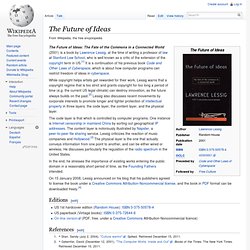
While copyright helps artists get rewarded for their work, Lessig warns that a copyright regime that is too strict and grants copyright for too long a period of time (e.g. the current US legal climate) can destroy innovation, as the future always builds on the past.[2] Lessig also discusses recent movements by corporate interests to promote longer and tighter protection of intellectual property in three layers: the code layer, the content layer, and the physical layer. The code layer is that which is controlled by computer programs. Editions[edit] References[edit] External links[edit] Lawrence Lessig. Lawrence Lessig. Blog, news, books. Who Does That Server Really Serve? By Richard Stallman (The first version was published in Boston Review.)
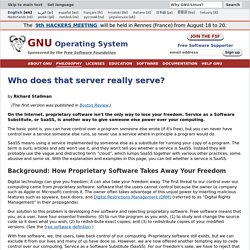
On the Internet, proprietary software isn't the only way to lose your freedom. Service as a Software Substitute, or SaaSS, is another way to give someone else power over your computing. The basic point is, you can have control over a program someone else wrote (if it's free), but you can never have control over a service someone else runs, so never use a service where in principle a program would do. SaaSS means using a service implemented by someone else as a substitute for running your copy of a program.
Background: How Proprietary Software Takes Away Your Freedom Digital technology can give you freedom; it can also take your freedom away. Our solution to this problem is developing free software and rejecting proprietary software. Opt out of global data surveillance programs like PRISM, XKeyscore, and Tempora - PRISM Break. Protect your freedom and privacy; join us in creating an Internet that's safer from surveillance. Mass-scale surveillance like PRISM is disturbing, but is an unsurprising effect of how centralized the Web is today.
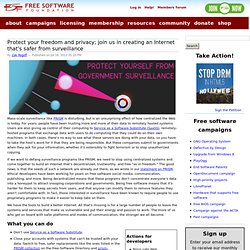
For years, people have been trusting more and more of their data to remotely hosted systems. Users are also giving up control of their computing to Service as a Software Substitute (SaaSS), remotely-hosted programs that exchange data with users to do computing that they could do on their own machines. In both cases, there's no way to see what these servers are doing with your data, so you have to take the host's word for it that they are being responsible. But these companies submit to governments when they ask for your information, whether it's ostensibly to fight terrorism or to stop unauthorized copying. Internet Archive: Digital Library of Free Books, Movies, Music & Wayback Machine. Brewster Kahle: Universal Access to All Knowledge. Bio Stewart Brand Stewart Brand is co-founder and president of The Long Now Foundation and co-founder of Global Business Network.
He created and edited the Whole Earth Catalog (National Book Award), and co-founded the Hackers Conference and The WELL. His books include The Clock of the Long Now; How Buildings Learn; and The Media Lab. His most recent book, titled Whole Earth Discipline, is published by Viking in the US and Atlantic in the UK. Brewster Kahle. Brewster Kahle (/ˈkeɪl/ KAYL;[2] born 1960)[1][3] is an American computer engineer, Internet entrepreneur, internet activist, advocate of universal access to all knowledge, and digital librarian.[4] Biography[edit] Kahle grew up in Scarsdale, New York, and went to Scarsdale High School.
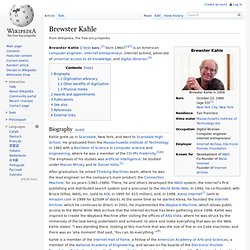
He graduated from the Massachusetts Institute of Technology in 1982 with a Bachelor of Science in computer science and engineering, where he was a member of the Chi Phi Fraternity.[5][6] The emphasis of his studies was artificial intelligence; he studied under Marvin Minsky and W. Daniel Hillis.[5] After graduation, he joined Thinking Machines team, where he was the lead engineer on the company's main product, the Connection Machine, for six years (1983–1989). Universal Access to All Knowledge. Advances in computing and communications mean that we can cost-effectively store every book, sound recording, movie, software package, and public web page ever created, and provide access to these collections via the Internet to students and adults all over the world.
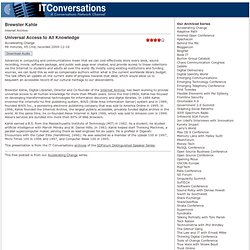
By mostly using existing institutions and funding sources, we can build this as well as compensate authors within what is the current worldwide library budget. The talk offers an update on the current state of progress towards that ideal, which would allow us to bequeath an accessible record of our cultural heritage to our descendants. The Writing Show - Information and Inspiration for Writers. The Writing Show - Information and Inspiration for Writers. RSS Link With Hugh McGuire, founder of Librivox Hugh McGuire recently founded a public domain audio book library based on volunteer contributions.

In this introduction to Librivox, Hugh explains: How his repository works Why so few authors are making audio recordings of their own books available How free podcast versions of books could help promote sales of physical copies How Creative Commons licenses are providing an alternative to restrictive practices of Hollywood and the music industry How you can volunteerand listen Interviewee: Hugh McGuireHost: Paula BDate: August 23, 2005Running time: 22 minutesFile size: 8 megabytesRating: GLibrivox: librivox.blogsome.com. LibriVox Aaron Swartz, 1986-2013.
This weekend the Public Domain lost one of its most gifted and passionate advocates when Aaron Swartz committed suicide, at age 26.
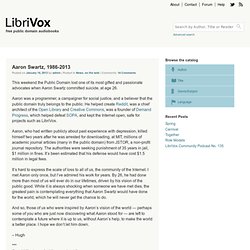
Aaron was a programmer, a campaigner for social justice, and a believer that the public domain truly belongs to the public. JSTOR. JSTOR (pronounced JAY-stor;[3] short for Journal Storage) is a digital library founded in 1995.
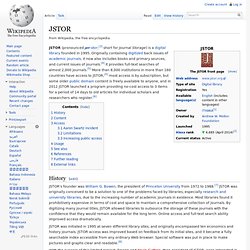
LibriVox Aaron Swartz, 1986-2013. Essays from the bleeding edge of publishing. Hugh McGuire.